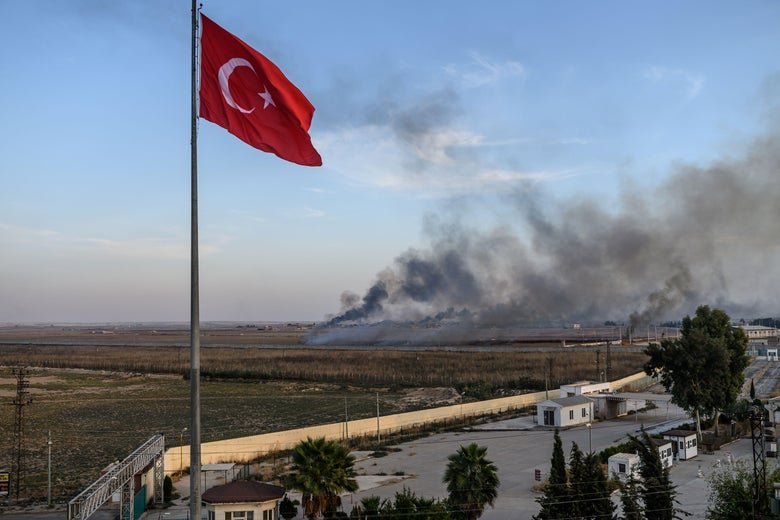
- ARAB NEWS
- 02 Jul 2025

Israel is one of the countries that has been deeply concerned about the developments in Syria over the past eight years. Although Tel Aviv has kept a relatively low profile during the war on its doorstep, it could be seriously affected by the consequences of the latest developments, particularly in northeastern Syria.
Recent attacks by Israeli forces in Damascus and the Gaza Strip are very much related to its concerns arising from the Syrian conflict.
The situation in Gaza escalated on Nov. 12 when Israel launched an airstrike that killed Bahaa Abu Al-Ata, the commander of resistance group Islamic Jihad, along with his wife, Asma. Israeli warplanes also launched a strike targeting Islamic Jihad member Akram Al-Ajouri in the Syrian capital, Damascus. Two people, including Al-Ajouri’s son, were killed and 10 injured.
On Nov. 13, Turkey denounced the Israeli attacks on the blockaded Gaza Strip, calling on the country to stop its aggression and end an occupation that has become state policy.
Last week, Turkish Foreign Minister Mevlut Cavusoglu claimed that a group of countries, led by Israel, sought to establish a terrorist state in northern Syria. Israel has been highly critical of Turkey’s anti-terror Operation Peace Spring, which targeted the People’s Protection Units (YPG), the Syrian wing of the Kurdistan Workers’ Party (PKK). But more importantly, Tel Aviv was frustrated by the decision of the US to withdraw from Syria, leaving Israel in the middle of a war in which a range of powers have an interest. The Israelis interpreted the US withdrawal as a betrayal that could contribute to the unraveling of the region.
Dozens of Israeli military reservists reportedly signed a petition calling on the Israeli government to send not only food, clothing and medicine but also military and intelligence assistance to the Kurdish militias against which Turkey is waging war.
Increased Turkish influence in northeastern Syria would leave Israel unable to operate as freely in this strategic area, near the border with Iran, as it could when it was under Kurdish control. Throughout the Syrian conflict, the Israeli air force has repeatedly attacked Syrian military convoys and Lebanon’s Hezbollah. Such attacks would be more difficult without local allies to clear the path for operations.
Although in official state rhetoric Israel says the future of Syria is up to Syrians, in reality the Syrian regime remaining in power is the safest option for Tel Aviv. Israel was particularly concerned about the possibility of radical Islamist or Iranian forces gaining a foothold along the Golan Heights or replacing the regime. However, by August 2018 the Syrian regime had eased these fears by recapturing the area, along Israel’s northern border, thanks to the support of Russian and Iranian forces.
Turkey’s growing influence in Syria is a matter of concern for Israel in view of Ankara’s staunch support for Palestinian rights.
Sinem Cengiz
This development did not completely reassure Tel Aviv, however. Turkey’s growing influence in Syria is a matter of concern given that Ankara is a staunch supporter of Palestinian rights.
If Turkish-Israeli relations had not declined so sharply in the past decade, Israel would have fewer worries. Realist politics would suggest that both countries should make an effort to mend their relationship in the face of the Syrian war, but realism is not the only factor that affects decision making.
Other factors play a role and this is what we see in Turkish-Israeli relations.
Two decades ago the nations cooperated against Syria, which saved them both from threats emanating from Damascus at the time. The defense and intelligence cooperation that marked the relationship between the two countries in the late 1990s was the result of a specific strategic context. At that time, Turkey was driven closer to Israel out of regional necessity, as the former needed the latter as a bulwark against Syria. Those 1990s defense ties emerged from a domestic political context in Ankara and Tel Aviv.
This domestic context has changed in both countries. The mutual mistrust that has grown during the past decade has become a barrier to any rapprochement. In addition, the geopolitical circumstances that once drove Turkish-Israeli cooperation have changed significantly.
Now that Turkey has cleared out northeastern Syria and established its own controlled area there for refugees, Russia and Iran have increased their sphere of influence, and the US and its Kurdish allies have gradually lost their influence, there is no ally left for Israel to cooperate with against threats that might arise in the future. Thus, Israel finds itself stuck in a precarious position in the Syrian war.